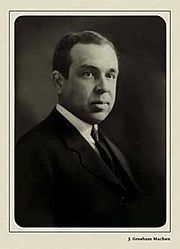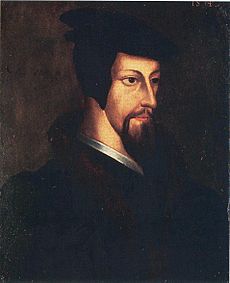Orthodox Presbyterian Church facts for kids
Quick facts for kids Orthodox Presbyterian Church |
|
|---|---|
 |
|
| Abbreviation | OPC |
| Classification | Protestant |
| Orientation | Presbyterianism |
| Theology | Confessional Reformed |
| Polity | Presbyterian |
| Moderator | Brian De Jong |
| Associations | North American Presbyterian and Reformed Council, International Conference of Reformed Churches |
| Region | North America |
| Headquarters | Willow Grove, Pennsylvania |
| Origin | June 11, 1936 Philadelphia, Pennsylvania |
| Separated from | Presbyterian Church in the United States of America |
| Separations | Bible Presbyterian Church (1937) |
| Congregations | 332 (2023) |
| Members | 33,520 (2023) |
| Ministers | 599 (2023) |
| Other name(s) | Presbyterian Church of America (1936–1939) |
The Orthodox Presbyterian Church (OPC) is a type of Protestant church that follows Presbyterian traditions. It is mainly found in the United States, but also has churches in Canada, Bermuda, and Puerto Rico.
The OPC was started by a group of people from the Presbyterian Church in the United States of America (PCUSA). They were worried about new, modern ideas changing the church's traditional beliefs in the 1930s. Even though the OPC is not a very large church, its ideas have been important to many Christians.
Contents
How the OPC Began
The Orthodox Presbyterian Church was officially formed on June 11, 1936. A minister named John Gresham Machen was the main person behind its creation.
Disagreements Lead to a New Church
In the early 1900s, some leaders in the PCUSA began to accept more modern and liberal ideas about Christianity. Machen and others felt these new ideas went against the Bible's teachings.
In 1929, Machen helped start Westminster Theological Seminary to train ministers in traditional beliefs. He also started a new group to support missionaries who shared his views.
The leaders of the PCUSA did not like what Machen was doing. In 1935, they told him and other ministers to stop working with the new mission group. When they refused, they were removed from their roles in the PCUSA.
The Church is Founded
After being suspended, Machen and his supporters met in Philadelphia in 1936. They decided to form a new church, which they first called the Presbyterian Church of America.
Sadly, Machen died just a few months later in 1937. That same year, a small group led by Carl McIntire left to form the Bible Presbyterian Church.
In 1939, the PCUSA sued the new church over its name. To solve the problem, the church changed its name to the Orthodox Presbyterian Church, which it is still called today.
What the OPC Believes
The OPC's beliefs come from the Protestant Reformation, a major movement in Christian history. They especially follow the teachings of John Calvin, a French reformer from the 1500s.
The church's official beliefs are written down in the Westminster Standards. These documents include the Confession of Faith and two catechisms (books of questions and answers about faith). The OPC uses these standards to guide what it teaches and how it practices its faith.
Here is a summary of the OPC's main beliefs:
- The Bible: The Bible was inspired by God, so it is completely true and has no errors. It is the only source of God's special teachings for people today.
- God: There is one true God who is a spirit. He is holy, fair, loving, and merciful. God exists as three persons: the Father, the Son, and the Holy Spirit.
- Creation: God created the universe and everything in it. He is in complete control of everything that happens.
- Sin and Salvation: Because the first man, Adam, sinned, all people are born with a sinful nature. But God made a plan for sinners to be forgiven and have eternal life by having faith in Jesus Christ.
- Jesus Christ: The Son of God became a human, Jesus, who was born to the virgin Mary. Jesus lived a perfect life, died on the cross for the sins of his followers, and rose from the dead. He is now in heaven and will one day return to judge the world.
- The Holy Spirit: The Holy Spirit helps people believe in Jesus. When they do, God forgives their sins and accepts them. The Spirit lives inside believers, helping them to live in a way that pleases God.
- God's Law: Believers try to obey God's moral law, which is summarized in the Ten Commandments. They do this not to earn salvation, but out of love for God.
- The Church: Christ created the church to bring his people together. Churches do this through preaching, prayer, and sacraments. The two sacraments are baptism and the Lord's Supper.
Church Government and Structure
The OPC is governed using a Presbyterian system. This means it is led by elders chosen by the church members.
Local Church Leadership (Session)
Each local church is led by a group called the Session. The Session is made up of the minister and ruling elders. They are in charge of worship services, baptisms, and caring for the church members.
Regional Church Leadership (Presbytery)
Churches in a specific area are grouped into a Presbytery. A presbytery is a governing body made up of all the ministers and an elder from each church in that region. It helps with starting new churches, training new ministers, and solving difficult problems.
National Church Leadership (General Assembly)
The General Assembly is the highest court of the church. It meets once a year and includes ministers and elders from all the presbyteries. The General Assembly makes final decisions on matters of belief and church rules. It also oversees the church's mission work.
The OPC Today
As of 2024, the OPC has 599 ministers and about 33,520 members in 332 churches. The churches are organized into 17 presbyteries across the United States and Canada.
Missions and Outreach
The OPC is active in sharing its faith around the world. It has missionaries in several countries, including China, Ethiopia, Haiti, Uganda, and Ukraine. The goal is to help establish new Reformed churches in different cultures.
In North America, a special committee helps start new churches and supports existing ones.
Relationships with Other Churches
The OPC works with other churches that share similar beliefs. It is a founding member of the North American Presbyterian and Reformed Council (NAPARC). This group includes other Presbyterian and Reformed churches in North America, like the Presbyterian Church in America (PCA).
The OPC is also a member of the International Conference of Reformed Churches (ICRC), which connects it with similar churches all over the world.
See also
 In Spanish: Iglesia presbiteriana ortodoxa para niños
In Spanish: Iglesia presbiteriana ortodoxa para niños
 | John T. Biggers |
 | Thomas Blackshear |
 | Mark Bradford |
 | Beverly Buchanan |



